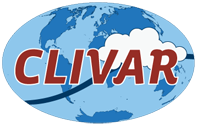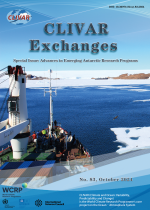10th Session of the CLIVAR Pacific Panel
The 10th Session of the CLIVAR Pacific Panel was held in Santiago, Chile on 10-11, October, 2015. This session was coupled with the 11th ICSHMO meeting on 5-9 October
The panel meeting was held by the Millennium Institute of Oceanography, Chile.
Local Logistics (Kindly provided by local organizer, IMO)
Agenda
Meeting room: Room "Sala 19 Sur" of the ICSHMO venue. (The room is next to the poster area on the ground floor)
Format: 10 min talk/10 min discussion on action items
Saturday, Oct 10th
Intro, major new programs, major PP questions
9:00-9:10 Welcome/organization/scope (Alex/Matt)
Session 1: Opportunity for new challenges within PP (cont’)
09:10-09-30: Pacific Decadal Variability/Hiatus (Mat, Boris)
- What are the main characteristics of decadal natural variability in the Pacific?
- What are their related mechanisms ?
- How do these natural variations relate to the recent hiatus ?
09:30-09:50: Pacific regional sea-level changes: Insights from observations (Tatsuo)
- What are the available observational tools regarding Pacific sea level variability?
- What are the major natural decadal sea-level patterns in the Pacific ?
- What are the major uncertainties ?
- How do they alias the sea-level anthropogenic pattern?
- Could the sea level observing system in the Pacific be improved ?
09:50-10:10: Pacific regional sea-level changes: Model projections (Mat/Mat)
- What are the predicted regional sea level changes in the Pacific for the 21st century?
- What are the major CMIP model biases in terms of sea level variability ?
- What are the impact of the CMIP models biases on these predictions ?
10:10-10:30: Vulnerability and training (Awnesh)
10.30-11.00: Coffee Break (30min)
11:00-11:20 First general discussion on new challenges to include in PP agenda (Xiaopei /Matt, Alex)
- Amongst all the topics discussed above and given our limited availability, what shoudl the PP priorities regarding new PP research challenges (aside Pacific observing system design, ENSO research and WBC dynamics) in the coming years?
Session 2: Observation programs: status and future plans
11.20-11.40: West: SPICE (Alex)
- How does water connects with the equator?
- How does this modulate ENSO?
- How much vertical on horizontal mixing on the way ?
11.40-12:00: West: NPOCE (Dr. Wang Jing - Dongliang)
- What are the three-dimensional structure and variability of the Pacific low latitude western boundary currents?
- How does the western Pacific Ocean circulation interacts with the ambient current systems (ITF, SCSTF, tropical-extraopical exchange, etc.)?
- How are the warm pool and the Asian monsoon system affected by the variability of the western Pacific Ocean circulation?
12:00-12.20: WBC dynamics (Xiaopei)
- What is the key dynamics that controls the multi-scale variability in the WBCs?
- What is the role of WBCs in the open ocean-marginal sea exchange and air-sea interaction?
- How do the WBCs response and affect global climate change?
12:20-14:00 Lunch
Session 2: Observation programs: status and future plans (cont’)
14.00-14.20: Basin scale: Paleo records (Kim)
- What are the currently available proxy data in the Pacific for climate studies?
- To which extend can they be considered as representative of a climate mode such as ENSO?
- What paleo proxies can be used to study the spatial evolution of ENSO?
14.20-14:40: Basin scale: TPOS-2020 (Billy)
- What is the current status of TPOS?
- What are the next milestones?
- What are TPOS expectations from PP?
14:40-15.00: East: Peru including TPOS-eastern TT (Ken/Boris)
- What are the main discussions within TPOS-eastern TT ?
- What are the major observing programs at IMARPE and at InstitutoGeophysico del Peru ?
15.00-15:20: East: Chile (Wolfgang/Ramos)
- What are the major observing programs at IMO and at Univ. Of Concepcion ?
- What are the major science challenges that can benefit from CLIVAR synergies?
15.30-16.00: Coffee Break
Session 3: Opportunity for new challenges within PP
16:00-16:20: West: Coordination including TPOS WBCs (Alex/Xiaopei/Dongliang)
- How do we coordinate science and data between SPICE, NPOCE, etc
- How and when do we make data available to the community
After SPICE and NPOCE: a WBC observing system including ITF?
16:20-16-40: Southeast Pacific variability(Ramos/Boris/Wolfgang)
- What are the major science challenges that can benefit from CLIVAR synergies?
- What are the observations planned and needed?
16.40-17.00: ITF plans (Dr. Wang JingforDongliang; Alex for Janet Sprintall)
- ITF TT: follow-ups and plans
- PGI
17-00-17-30: PP feedback on CLIVAR Science Plan (Boris)
19.30-22.00: PP diner (no specific fund available)
Day 2: Sunday, Oct 11th
Session 4: ENSO
09:10-09:30: ENSO PP: Relation with ENSO RF and IOP (Mat)
- Presentation on ENSO related work in ENSO RF and IOP
09:30-09-50: ENSO extreme (Agus/Wenju)
- What are the characteristics of ENSO extreme events ?
- How should they be defined ?
- Do they display specific mechanisms ?
- How predicatable are extreme ENSO events ?
- What are the oceanic and atmospheric teleconnections of extreme ENSO?
- How are these peculiar events represented in CMIP models ?
09:50-10-10: ENSO diversity (Antonietta)
- What are the characteristics of ENSO CP/EP events ?
- How should they be defined ?
- What are the EP/CP specific mechanisms ?
- Is ENSO Modoki a truly independent mode of variability?
- How predicatable are these two types of events ?
- What are the oceanic and atmospheric teleconnection of CP/EP ENSO?
- How are these two types events represented in CMIP models ?
10:10-10-30: Interbasin interactions (Mat/Dongliang)
- What is the impact of the extra-tropical Pacific on ENSO?
- What is the impact of Indian Ocean variability on ENSO?
- What is the impact of Atlantic variability on ENSO?
- If any, does it occur through an oceanic or atmospheric pathway ?
- How these interbasin interactions are simulated in CMIP models ?
- What is the best modelling strategy to further progress on this question ?
10.30-11.00: Coffee Break (30mn)
Session 1: ENSO (cont’)
11:00-11-20: ENSO variability at paleo timescales? (Kim)
- What do we know about ENSO variations on paleo timescales?
- What are the related uncertainties?
- Does models agree with proxy data for the different climate ?
11:20-11-40: ENSO predictability (Ken)
- What is the current accuracy of ENSO prediction from statistical/coupled models ?
- What are the impact of dynamical model drift/biases on ENSO prediction?
- Can a better data management allow to initialize more efficiently ENSO dynamical forecasts?
- Could we estimate the credibility of ENSO forecasts in real-time using a mechanistic approach?
11:40-12:00: Main ENSO topics to be addressed by PP (Wenju)
- Amongst all the topics discussed above and given our limited availability, what shoudl the PP priorities regarding ENSO research in the coming years?
12:00-13:00: Business as usual (membership, etc…) (Mat/Alex)













